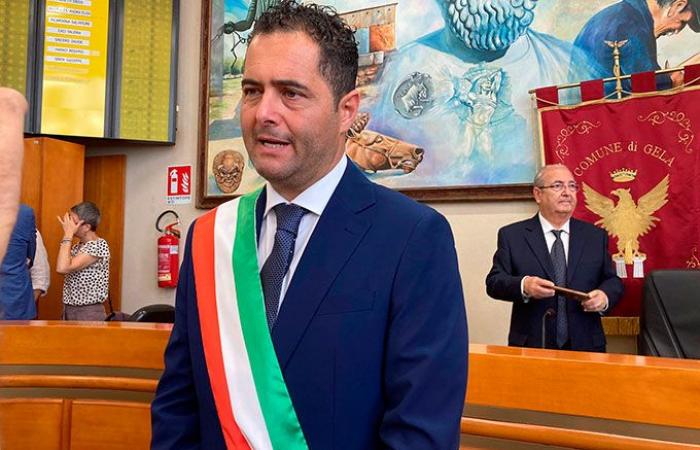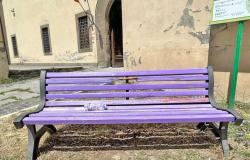Terenziano Di Stefano is the new Mayor of the Municipality of Gela. The candidate of “Progetto Gela”, a broad centre-left progressive camp, achieved a total of 13,717 preferences in the 71 sections examined during the ballot, equal to 61.08%.
Her competitor, Grazia Cosentino, a candidate for the center-right, stopped at 8,793 preferences, equal to 39.92%. A landslide victory. In the next few days, the formal proclamation of the elected mayor will take place, who will succeed the outgoing mayor Lucio Greco, of whom Di Stefano was deputy, as well as councilor, for a large part of the mandate.
Accompanied by his wife and two children, Terenziano Di Stefano entered the city hall and then the mayor’s room, wearing the tricolor sash, giving warm hugs to everyone, in a triumphal atmosphere but without losing the lucidity in giving himself to reporters: “As I have always reiterated in these intense days of election campaign – he declared – we have offered a political proposal following a path with the head, the heart and the legs. In the same way, that is, with the head, the heart and the legs, we will govern the city that we want to relaunch with an ambitious project”. This, starting immediately, considering the water emergency.
“The current situation – he continued – requires that immediate priority be given to water and in fact I will call Caltaqua, Ati and Eni as soon as possible, because we must overcome this water crisis”. And on the danger of new deliveries to the Timpazzo landfill after the closure of Lentini, Di Stefano specified that “we will tell Schifani, if it were really necessary to do so, that we will not become the garbage dump of Sicily”. Once the dispute was over, the new mayor wanted to reassure the citizens: “I am the mayor of everyone, no one should feel excluded. As promised – he concluded – there will be no distance with the citizens”.
On the occasion of the second round held on Sunday 23rd (from 7am to 11pm) and Monday 24th June (from 7am to 5am), 22,786 voters voted, of which 11,502 men and 11,284 women, equal to 35.26%. There were 66 blank ballots, 260 invalid ballots, 4 contested. Di Stefano also won the majority prize and consequently his coalition, or rather, the three lists that passed the barrier, gained fifteen seats. As unexpected and painful as it was, for Grazia Cosentino “it was not a defeat”.
In acknowledging the rather clear outcome of the vote, Cosentino simply stated that “the city has decided not to follow through on our project for change.” Of course, “as an engineer I always look at the numbers and compared to the first round,” she admitted, “the numbers don’t add up, something didn’t go right.
But I retain the warmth of this experience and the new friendships that were born. I take this opportunity to thank those who supported me until the end. I will return to be an official of Impianti srr – he underlined – but I intend to follow up on the electoral mandate of city councilor given to me by the voters”.
In an electoral event with strong farcical and Leopard-like overtones, the one who most of all truly believed in it won, without ever losing sight of the objective. And that is Di Stefano. The agreement around him between the Pd, M5s and A good idea was born a long time ago and took its first steps in the city council in the last year of his mandate.
The agora was supposed to widen the field but when his name came out, Di Stefano kept the bar straight despite receiving the No votes from Lo Nigro, Donegani and Franzone, even risking losing the contribution of the Democratic Party. He recruited the autonomists, Melfa, De Luca and Azione di Calenda, as well as the PCI, whose contribution fell well below expectations, but just enough to earn the coveted run-off, against the favorite of the battleship of the parties of centre-right.
Her insistence was rewarded by a couple of decisive moves. The first, absolutely decisive, in view of the decisive clash in the second round in a match that started from 0-0, was the will not to ally with anyone, despite the delay with respect to Cosentino recorded in the first round.
In the prospect of a majority bonus of 15 councillors, he galvanized over a dozen potential councilors from the ranks of the three lists that had passed the barrier. This meant maintaining the convinced contribution of three parties, namely Pd, M5s and A good idea itself, which at a local level is a consolidated reality which in terms of mobilization has nothing to envy of the two allied national parties.
This has also increased its internal leadership, with the three parties embracing and pushing their candidate to the finish line, making this leadership also visible externally.
From this last point of view, the move to acquire the contribution of Filippo Franzone in the second round was intelligent. Mind you, it is Di Stefano who chooses Franzone and not vice versa. Strengthened by three thousand votes obtained on a personal level in the first round, but with a list left out of the city council, Franzone risked being left with a handful of flies in his hand. The three points (a lawyer for the transition to Catania, defense of health and hospital, water) subjected to scrutiny by the two candidates, leads Franzone to join Di Stefano’s project only because Cosentino rejects the first point, relating to the transition to the metropolitan city Etna.
If Cosentino had also accepted the first point, on the confession of Franzone himself, three out of four members of the delegation were oriented towards Cosentino. Instead, Di Stefano’s availability took the chestnuts out of the fire. An availability towards Franzone that Di Stefano renewed for the third time, despite Franzone’s No at the agora and Franzone’s second No to the same proposal that Di Stefano had formulated on two of the three points (transfer to Catania and health, with its own department) the day after the agora.
Obviously, Franzone’s contribution to the ballot did not mean the shift of three thousand opinion votes. The opinion vote, by definition, is not transferable from one object to another. What shifts is the clientelistic vote, that is, something that cannot be associated with the pure figure of a civic figure like Franzone. His indication towards Di Stefano, however, undoubtedly increased and consolidated the credibility of the leadership externally.
On the other hand, even though she has proven to be a woman with attributes, Eng. Grazia Cosentino was unable to impose her own leadership on parties that dragged her to the first round, but without making her cross the 40% target, and then effectively abandoned her in the second round.
Which did not happen in the run-off with the center-right candidate in Caltanissetta. This has exposed more clearly the “political fragility” of a “bureaucratic” candidate, who was already paying the price by getting fewer votes than the lists in the first round. In the fifteen days preceding the appeal vote, none of the big names who had bet on Gela in the first round were seen again.
Neither Cuffaro, nor Mancuso or others. The center-right parties did not close ranks and allowed internal jealousies to creep in, aimed at boycotting the possible election of some possible candidates in the event of victory and majority prize in the second round. The transversalism towards the opponent was accompanied by the boomerang effect of the return of some former rebels. There would be no other explanation for such a debacle compared to the first round. There is no point in beating around the bush, since the first results of the counting showed that there was no match between the two competitors.






